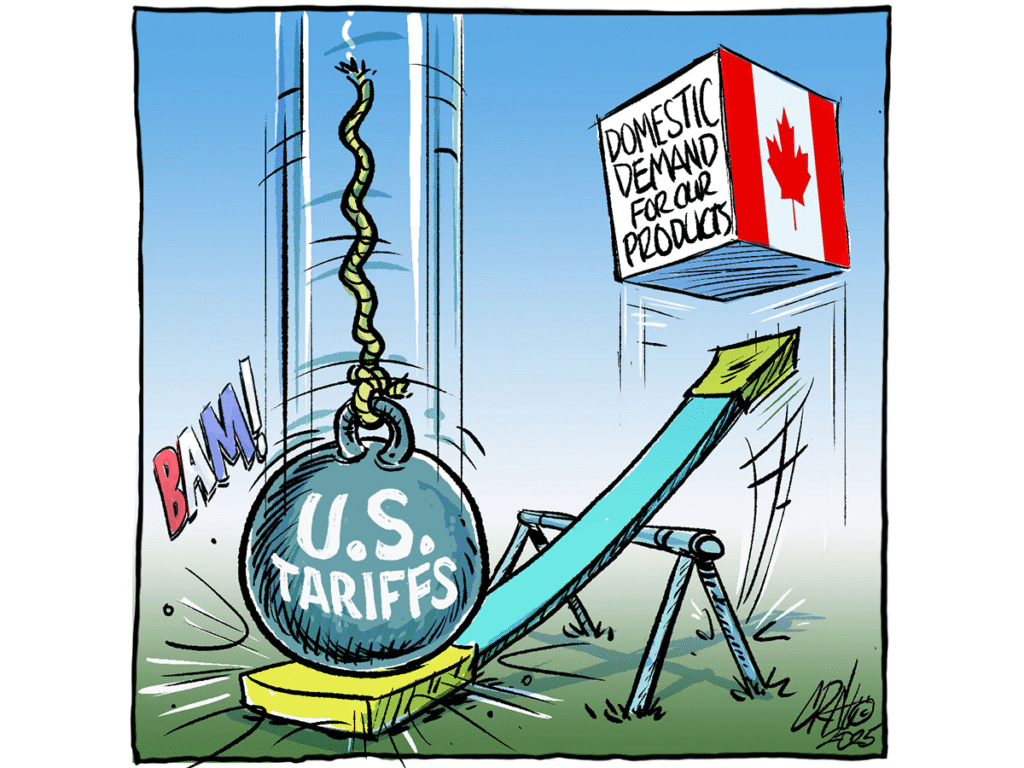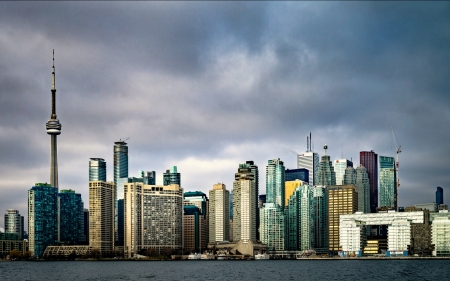At a September 5th press conference in Mississauga, Prime Minister Carney declared the death of a world order based on the endless expansion of free trade, and the dawn of an age of economic nationalism:
“The world is changing rapidly. The largest economy, the United States, is fundamentally reshaping all of its trading relationships. And we’re moving from an age that lasted decades, an age when free trade was a motor of global economic growth to a new age, an age of economic nationalism and mercantilism.“
Carney portrays this as a kind of necessary evil, an inevitable global shift which Canada must adapt to. He frequently states, in a somewhat resigned and disappointed tone, that “the steady process of integration” between Canada and the US is “now over”.
In response, his government seeks to end Canada’s reliance on the US market, and forge our own economic path by scrapping interprovincial trade barriers, undertaking “projects of national importance”, and sparking broad trade diversification.
While this strategy is the right response to the present geopolitical chaos unfolding around the world, there is no need to sell it as a necessary evil. Breaking Canada’s reliance on the US will undoubtedly be painful in many ways – in the same way that a smoker breaking his unhealthy reliance on nicotine is painful. But like the smoker quitting cigarettes, Canada’s present economic realignment is a decision that will yield great dividends in both the short and long term.
I once read an account by David Sedaris of his experience quitting smoking. While he was in the throes of cravings, about a week in, he noticed something incredible – climbing stairs had become easier, just like that. Nothing major, nothing earth-shattering, just a small but measurable improvement in his everyday life that testified to the wisdom of his decision to quit.
Likewise, Canada is starting to see some early benefits of breaking its addiction to the US market. An interesting by-product of the counter-tariffs we imposed on American steel is a massive surge in the Canadian can industry. Check out this short video report from CBC profiling a Quebec can manufacturer that is seeing a huge demand for its products, and is already looking to build a new factory in Windsor – a city which has one of the highest unemployment rates in the country:
For more positive outcomes of the current slow-motion decoupling of the Canadian and American economies, we can look to the one of the policies that Carney announced at his September 5th press conference, a federal “Buy Canadian” strategy, described in detail here:
“The government will introduce a new policy to ensure the federal government buys from Canadian suppliers, require local content when domestic suppliers are unavailable, extend this approach to all federal funding streams and Crown corporations, and provide a roadmap for provinces and municipalities to apply similar standards to their own procurement.“

Like the launching of projects of national importance, the push for trade diversification, and the crusade against interprovincial trade barriers, this Buy Canadian policy is being pitched as a response to US economic aggression. In reality, all of these things are good in and of themselves, and we should be pursuing them irrespective of the actions of the US government.
We should have been embarking on grand national projects, diversifying trade, toppling interprovincial trade barriers, and mandating that government purchases be earmarked for Canadian suppliers even before the Trump administration launched what the US President described as a campaign of “economic force” to annex us. We should continue to do these things after Trump is out of office.
Well before the Carney government launched this Buy Canadian strategy, citizens launched their own effort to reorient consumer purchases and travel away from the US. The /r/BuyCanadian subreddit, which existed well before the current trade war, has soared to 223,000 members.
Far from symbolic, the effects of millions of individual consumer and travel choices are adding up. I catalogued seven signs that the boycotts are working here.

Again, buying Canadian is something that we should already have been doing regardless of what the US does or does not do – but like most people, I never earnestly tried to do so before the current trade war. If patriotic shopping becomes an ingrained habit in some portion of the Canadian citizenry as a result of this trade war, we will have yet another thing to thank the Trump administration for.
The danger in portraying the new era of Canadian economic nationalism as a necessary evil, as the Carney government is sometimes prone to do, is that we risk failing to see all of the positives that are already arising just months into the experiment. Canada stands to gain a great deal of good by pursuing the economic nationalist policies that it has departed from since Mulroney dragged the country into his government’s disastrous Canada-US free trade agreement in the late 1980s.
If the government fails to amplify these positives, it risks playing into the hands of the many free trade fanatics writing for Postmedia (which is majority owned by Chatham Asset Management, an American hedge fund), some of whom have gone so far as to argue that Canada should destroy its supply management system to appease the US government.
Canada’s newfound embrace of economic nationalist policies is far more deeply rooted than the present geopolitical tension between Canada and the US, and knowingly or unknowingly draws from a deep, refreshing well of economic nationalist thought stretching from Sir John A. Macdonald and his National Policy to Walter Gordon and David Orchard more recently.
For a succinct summary of this line of thought, check out this clip from the 1988 Free Trade Election, in which John Turner predicted that an over-reliance on the US market would shatter the east-west-north economic axis that the Fathers of Confederation envisioned, throwing us into the “north-south influence of the United States” and transforming Canada into a “colony of the United States”:
He was right. Now, we have an opportunity to break free and re-establish the old east-west-north axis that ensured our sovereignty from Confederation until the late 1980s.
All content on this website is copyrighted, and cannot be republished or reproduced without permission.
Share this article!




The truth does not fear investigation.
You can help support Dominion Review!
Dominion Review is entirely funded by readers. I am proud to publish hard-hitting columns and in-depth journalism with no paywall, no government grants, and no deference to political correctness and prevailing orthodoxies. If you appreciate this publication and want to help it grow and provide novel and dissenting perspectives to more Canadians, consider subscribing on Patreon for $5/month.
- Riley Donovan, editor